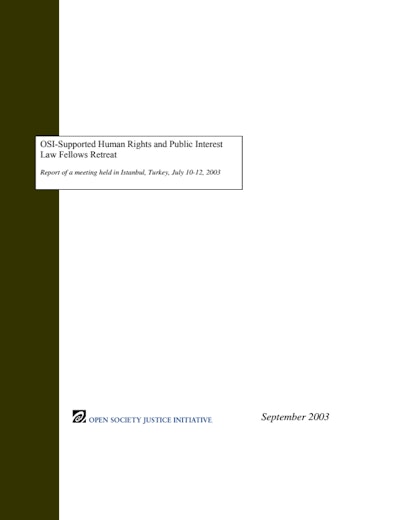OSI-Supported Human Rights and Public Interest Law Fellows Retreat
In July 2003, the Open Society Institute-supported Human Rights and Public Interest Law Fellows Retreat in Istanbul brought together 64 leading human rights scholars and activists from 25 countries on four continents. In his opening statement, Zaza Namoradze, director of the Budapest office of the Open Society Justice Initiative, observed that the participants collectively epitomized "the future of global human rights activism all in one room."
The Justice Initiative sponsors fellowship programs for students from non-western countries designed to encourage practical human rights advocacy while also contributing to the capacity of nongovernmental organizations. Initiated in 1996 by COLPI, forerunner of the Justice Initiative, the fellows programs have helped nourish a generation of scholar-activists from around the world with a shared commitment to human rights principles and first-hand experience in trying to bring about practical change. With Justice Initiative support, a total of 54 fellows have now attended human rights and public interest law courses at Columbia University, the Central European University, and the American University Washington College of Law, followed by one-year internships with nongovernmental organizations in their home countries.
The July meeting was the first gathering of fellows from all programs and all previous years—and by far the largest Open Society Institute-supported retreat of its kind to date. Also taking part were Open Society Institute Network Scholarship Program-supported OSI/Chevening scholars-law graduates from the former Soviet Union who study human rights for one year at the University of Essex. For all present, the meeting provided an opportunity to discuss, both formally and informally, the practice and theory of human rights; to hear first-hand accounts of the experiences and struggles of nongovernmental organization activists from around the world; to learn practical skills in organization, negotiation, and communication; and to recognize, take stock of, and deepen their de facto participation in a growing global network of human rights activists.
The range of fellows' interests, as demonstrated by the papers presented, was as rich and varied as the nationalities in attendance. Subjects included a first-hand account of a sustained legal challenge to the forced sterilization of Romani women in Slovakia; the legality of so-called Article 98 bilateral agreements used by the United States to shield its nationals from the jurisdiction of the International Criminal Court; the surge in importance of civil society organizations in Indonesia since 1998; and an analysis of discrimination against women in citizenship regimes in many countries globally.
Additionally, in response to prior suggestions from the fellows, skills training sessions were organized on five subjects related both to advocacy and nongovernmental organization: negotiating for better outcomes; resource and income development; public speaking; producing key documents; and basics in evaluation. Scheduled presentations are in themselves preparation for public advocacy—but just as important were the many informal contacts generated over the few days in Istanbul. With some fellows long embarked on human rights careers and others fresh out of university, potential areas for learning and collaboration were many. Some partnerships among fellows have already flowered, such as cooperation between Bulgarian and Russian fellows together with Interights, a London-based nongovernmental organization, in bringing cases from Russia before the European Court of Human Rights. Others will emerge.
Topics
- Climate Justice
- Digital Rights and Fair Elections
- Discrimination and Racial Justice
- International Crimes
